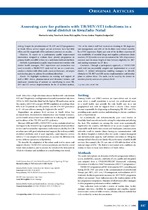Assessing and improving care for patients with TB/HIV/STIs in a rural district in KwaZulu-Natal South Africa

View/
Date
2011Author
Loveday, Marion
Scott, Vera
McLaughlin, Jennifer
Amien, Feroza
Virgina, Zweigenthal
Metadata
Show full item recordAbstract
Setting: Despite the prioritisation of TB, HIV and STI programmes
in South Africa, service targets are not achieved, have had little
effect, and the magnitude of the epidemics continues to escalate.
Objective. To report on a participatory quality improvement
intervention designed to evaluate these priority programmes in
primary health care (PHC) clinics in a rural district in KwaZulu-Natal.
Methods: A participatory quality improvement intervention with
district health managers, PHC supervisors and researchers was
used to modify a TB/HIV/STI audit tool for use in a rural area,
conduct a district-wide clinic audit, assess performance, set targets
and develop plans to address the problems identified.
Results: We highlight weaknesses in training and support of
staff at PHC clinics, pharmaceutical and laboratory failures, and
inadequate monitoring of patients as contributing to poor TB,
HIV and STI service implementation. In the 25 facilities audited,
71% of the clinical staff had received no training in TB diagnosis
and management, and 46% of the facilities were visited monthly
by a PHC supervisor. Eighty per cent of the facilities experienced
non-availability of essential drugs and supplies; polymerase chain
reaction (PCR) results were not documented for 54% of specimens
assessed, and the mean length of time between eligibility for ART
and starting treatment was 47 days.
Conclusion: Through a participatory approach, a TB/HIV/STI
audit tool was successfully adapted and implemented in a rural
district. It yielded information enabling managers to identify
obstacles to TB, HIV and STI service implementation and develop
plans to address these. The audit can be used by the district to
monitor priority services at a primary level.
